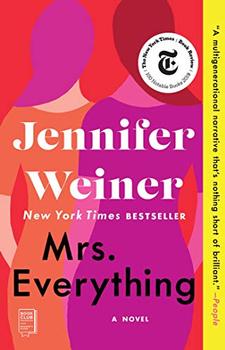Summary | Excerpt | Reading Guide | Reviews | Beyond the Book | Read-Alikes | Genres & Themes | Author Bio

This article relates to Mrs. Everything
 Jennifer Weiner's novel Mrs. Everything confronts the notion that a woman can do and be everything to everyone. From the 1950s through the early 2000s, women in America became liberated from many household chores due to time-saving inventions. Refrigerators, dishwashers, laundry appliances, even automatic coffee makers, all helped lighten the load of housework.
Jennifer Weiner's novel Mrs. Everything confronts the notion that a woman can do and be everything to everyone. From the 1950s through the early 2000s, women in America became liberated from many household chores due to time-saving inventions. Refrigerators, dishwashers, laundry appliances, even automatic coffee makers, all helped lighten the load of housework.
The invention of the electric refrigerator-freezer revolutionized lives, and the entire food industry. Designers tinkered with various technologies as early as the 1700s, but a self-contained household fridge wasn't manufactured until the early 1900s when companies such as Kelvinator, Electrolux, and Frigidaire patented and developed them. By the 1940s, most families in America had a plug-in fridge. No longer did the family cook have to make daily trips to the garden, the milking shed, or the market for fresh food. Frozen foods and convenience items could be purchased and stored for weeks; recipes like Jell-O desserts relied on refrigeration. Before the advent of artificial refrigeration, people stored cold goods in ice boxes or root cellars. In parts of the world where refrigeration is not available, women still spend the majority of their day growing crops, milking dairy herds, or, at the very least, going to market.
KitchenAid launched their first dishwasher in 1949, based on an invention by Josephine Cochrane, who exhibited her prototype dishwashing machine at the 1893 World's Fair. Automatic dishwashers became available to consumers in the 1950s but were expensive and therefore not widely adopted until the 1970s when they became a favorite time-saver. As of 2017, an estimated 68% of American homes have a dishwasher.
Laundry, traditionally considered women's work in most of the world, can take all day. I've seen women in parts of Africa and Central America walk more than a mile, laundry on their heads, to the closest river where they pound clothing against rocks and dry garments from branches. In such cases, doing laundry can be a social event and a time to bathe children or to cool off from extreme heat. That said, in the 21st century, most people in America have access to automatic laundry appliances, either at home or at coin-op sites. What used to take all day (or more than a day if weather precludes drying) can now be accomplished in an hour or two. Early versions of today's laundry conveniences include the bucket and hand washboard, the two-stage washing tub with hand-cranked wringer, or the original Maytag, where a tub filled with water and clothes was hand cranked.
The 20th century also saw the invention of many other time-saving appliances. In 1922, inventor Stephen J. Poplawski developed the first electric blender, designed to make malts and milk shakes at soda fountains. The ironically named Mr. Coffee machine was launched in the early 1970s. Its ability to brew multiple cups of fresh coffee at the push of a button—and keep the coffee hot—eliminated the preparation and waiting time required for filtered or percolated coffee. In 1971 Paris, Pierre Verdon first exhibited his Le Magi-Mix, a compact household version of his own earlier restaurant-scaled food processor Robot-Coupe. Carl Sontheimer, an American engineer and inventor, refined Verdon's machines to produce the Cuisinart.
Household appliances will continue to evolve, allowing people more free time for other pursuits. But there is a risk of becoming overly reliant upon devices. Appliances break, and power outages happen. As convenient as these household inventions are, the value of knowing how to manage without them persists.
Filed under Medicine, Science and Tech
![]() This "beyond the book article" relates to Mrs. Everything. It originally ran in July 2019 and has been updated for the
April 2020 paperback edition.
Go to magazine.
This "beyond the book article" relates to Mrs. Everything. It originally ran in July 2019 and has been updated for the
April 2020 paperback edition.
Go to magazine.
The third-rate mind is only happy when it is thinking with the majority. The second-rate mind is only happy when it...
Click Here to find out who said this, as well as discovering other famous literary quotes!
Your guide toexceptional books
BookBrowse seeks out and recommends the best in contemporary fiction and nonfiction—books that not only engage and entertain but also deepen our understanding of ourselves and the world around us.